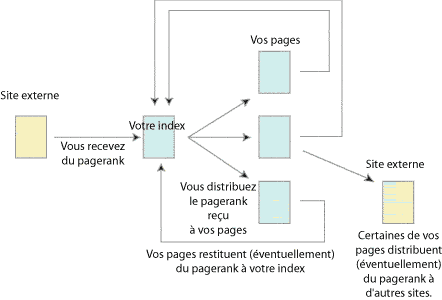
PageRank is the system used by modern search engines (including, of course, Google, which “invented” it) to determine the general interest of a site and, in a way, its popularity.
How does PageRank work?
By making maximum use of the PageRank you receive from external sites. The free LinkSpirit utility allows you to make the most of this resource by optimising your internal links.
By multiplying the number of links that point to your site. There are at least three very simple ways to do this:
Search all directories that deal with the same subject as your site. Also look for all general directories that list websites indiscriminately. Register in as many of them as possible. In this way (and by spending a lot of time) you can get several hundred links pointing to your site. Each link will earn you very little PageRank because it will be placed on a page that has hundreds of links itself. But they say that adding up pennies makes you a millionaire!
Exchange links with sites that talk about a subject close to yours (there is strength in numbers!). The better these sites are, the better the links will be. This way you will gain PageRank AND relevance on the subjects you deal with in common. However, be careful, if your site points to a site that is poorly rated by Google, your link exchange may do you more harm than good. So choose your partners carefully.
Talk about or, better still, get people to talk about your site on forums (whatever means you invent for that!). As mentioned in the introduction, this can be a double-edged sword and will only really work if your site is of high quality and the forum members say good things about it. Having 10 links pointing to your site saying “I just visited http://www.monjolisite.com and I think it’s so lame and really sucks. It sucks to death, don’t go there or you’ll die in excruciating pain” is not really conducive to your popularity. If, by misfortune, and taking into account the generally high PageRanks of the forums, this text excerpt appears in the first results for a search on “monjolisite.com”, you are in trouble!
The better your site is, the more “spontaneous” links you will get. That is, other site creators will decide on their own to link to your site because they think it is worthwhile and worth visiting. If you achieve this, you are definitely on the right track.
How do your links influence PageRank?
As mentioned above, internal links (from one of your pages to another of your pages) help distribute the PageRank received by each of your pages from external links.

External links usually point to your domain name. In this case, it is your index page that will automatically benefit from the popularity thus gained. (A link to www.mondomaine.com is considered by the engines as equivalent to a link to www.mondomaine.com/index.html).
In order for all the pages of your site to have a sufficient PageRank to appear in the search engine results, you must therefore have links from your index page to your other pages. This is a fairly standard configuration since your index page usually has a summary (an index!) that actually points to all the pages on your site.
If your pages themselves have a link back to the index (“Back to home page”, for example) they will give back to the main page of your site some or all of the PageRank received. Why “some or all”? Because your pages may contain several links. The PageRank they give back is divided by the number of links they have.
If we stick to this pure logic, we end up concluding that you should avoid including outgoing links in your pages at all costs. But things are not as simple as that!
If everyone came to this conclusion, websites would live in isolation and we would see the end of the web as we know it. The search engines have therefore added certain rules to this simplified scheme that encourage the exchange of links or, at the very least, avoid disadvantaging sites that play the exchange game to the delight of Internet users. What are these additional rules? Nobody knows exactly, they are part of Google’s secrets!
SEO specialists advise that each of your pages should contain at least one link to an external site that meets the following conditions
this site must deal with a subject close to the subject of your page
this site must have a high PageRank.
Think carefully about your internal links. Favouring one page to the detriment of the others is not, except in exceptional cases, an interesting strategy: only the words appearing on this page will give you a chance of being found by Internet users.
